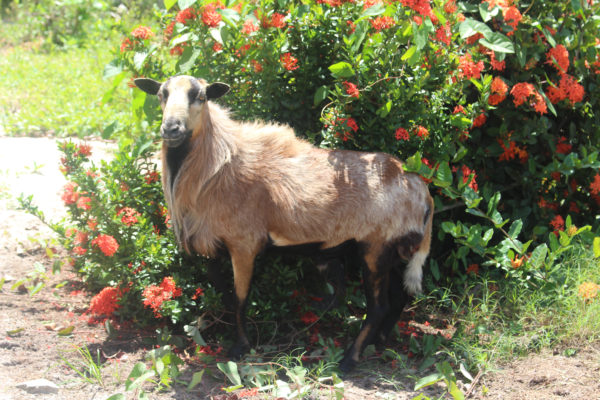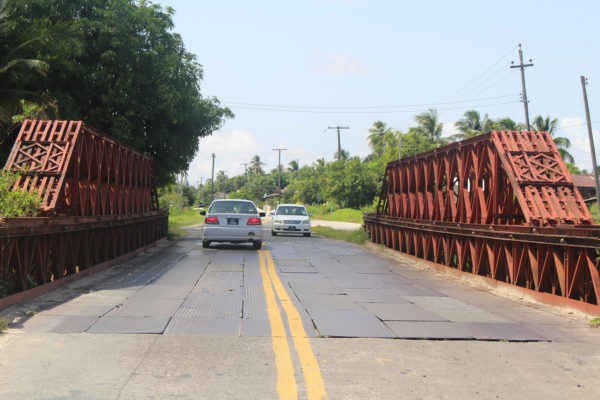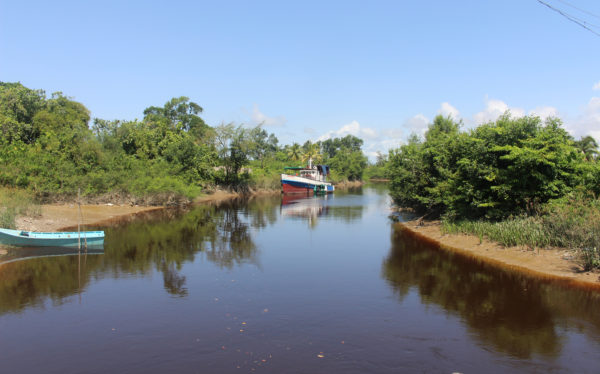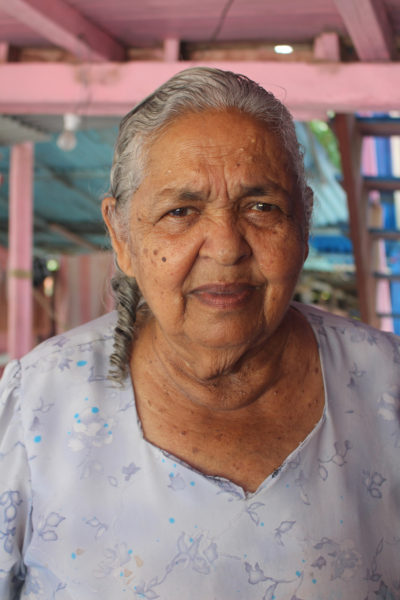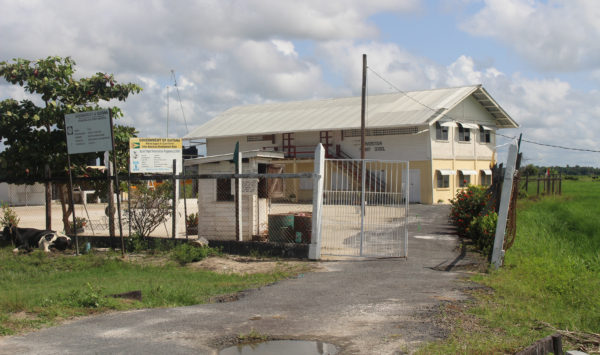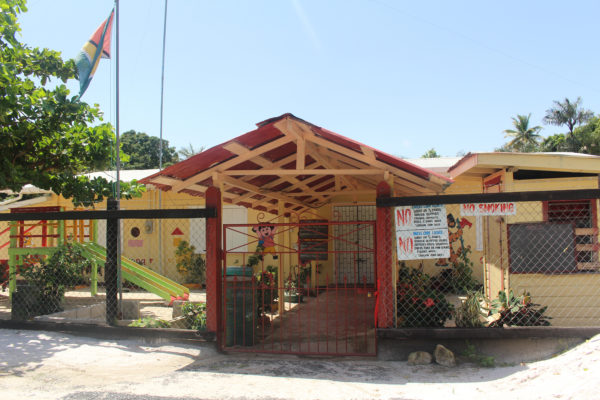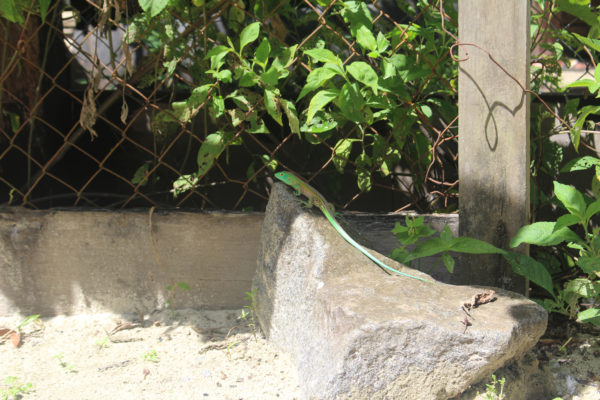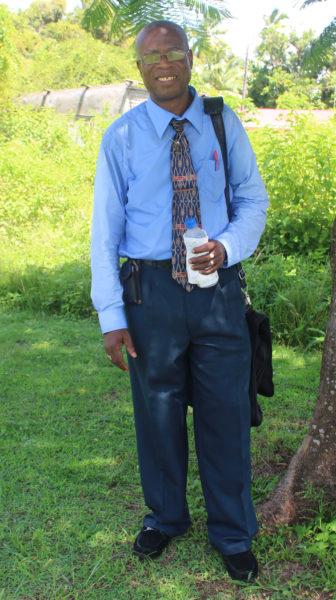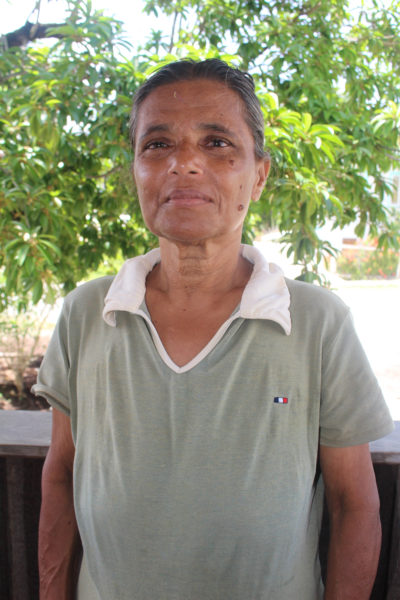Riverstown, a village on the Essequibo Coast, is pressed between Pomona and Airy Hall. Once you cross the railway-like bridge over a black water creek, you’re in Riverstown, where there are more than 700 residents.
When the World Beyond Georgetown visited, the noise around indicated that villagers were busy at work. One teenager, shirtless in the sun, pushed his cousins on a bicycle along the road; a ride they showed much appreciation for before he stopped so we could snap a photo.
Yasoda Dhanpattie, the children’s great-aunt, was excited to share what she knew. Born and raised in Riverstown, she recalled that during her girlhood years the houses were much smaller and made of mud/slab and had troolie for roofs.
She attended the Riverstown Government School that catered for grades one to nine (Prep A to Form Three). The school was then situated on the public road and its uniform was green kimono/pants with white shirts. Today the school is situated in the village on School Street, once called Coconut Dam and the students wear brown kimono/pants and cream shirts.
Dhanpattie said her grandparents came from India to work on the estate at Adventure and had subsequently moved to Riverstown. Her mother, she said, was born in Riverstown also.
“We went to school barefoot and we used to put we slate and slate pencil in a plastic bag. We used to use the Collins Dictionary that time. The dictionary use to come with a blue cover and it had the Oxford Dictionary too; that one had a black cover,” she said.
The loam road she traversed then was a terrible sight when the rain fell and they most times the children would arrive at school with muddy feet and clothes which they tried to clean with newspaper or brown paper. “The teachers use to beat with a cane whip, something like a bamboo. The handle curve like a umbrella handle. They use beat when you late and when you talking,” Dhanpattie recalled.
The water from the creek running below the bridge at of the head of Riverstown, she said, was what they used for drinking, cooking, washing and bathing. Lamps were made from tins and bottles. “We grow up with flambeau. We used to make lamps out of condense milk tins. The flambeau we make out of a bottle that we put mud all around the outside so the heat won’t break it,” she said.
According to the woman, she enjoyed country life more then, as it was nicer. “Riverstown was quiet then. Everyone used to live as one; now we got a lot of quarrels.”
The place, Dhanpattie said, floods during the spring tide; water runs into their yards and farms but drains off rather quickly. She wishes that the village could be provided with street lights.
A few lots away, 78-year-old Bhagwandai Sookdayo sat in her hammock quietly chipping vegetables while her husband lay on a spread below on the concrete with his eyes closed, relaxing, after just returning from the farm.
Sookdayo moved to Riverstown as a little girl. “The place bin look like bush. It had one and two mud house with troolie,” she said.
“Me went to Riverstown Scot School [which went on to become Riverstown Government School then Riverstown Primary]. That time the school bin ah run by the church people dem.”
She added, “That time we bin cook pun fireside and thing. Me bin ah eight year when me learn to cook. Long time you momma bin had to go wuk so you had to cook. Me father dead when me was seven years old. Me father get some fever and dead. Me ain’t know what kind of fever is that. By the time you get that fever, you ah dead out.” She, like Dhanpattie, once used the water from the black water creek for the same purposes.
Asked about the people in her village she replied, “Riverstown got all kinda people man; different type ah people. All na good and all na bad; some good and some badaration.
“Long time days been better than now. Long time thing bin cheap. Long time you coulda buy ration with $3. Mommy use to get dat $3. Abe lil children couldn’t gat that kinda money. Now-a-days lil picknie a walk de road wid $3,000 in dem hand. You coulda buy a pound sugar for a Gill, a pint kerosene oil for three cents, smoke herring a Gill, a cake ah sweet soap a Gill.”
According to Bhagwandai’s husband, during the same time he worked for $9 a week and still managed to save $3 every week.
Eventually the topic switched from long time money to long time children. “Long time children bin better more than now, one hundred per cent more respect. Nowadays children a cuss yuh and smoke dope. You frighten to talk to dem now,” she said.
“Long time when we [she and siblings] bin ah guh school we pass a old man. He bin ah tie out he cow on de dam while we bin ah pass. He was we neighba. Suh we pass he and we seh ‘Good Afternoon Nana.’ Then he get vex and pick a black sage and beat we and tell we must ‘nah seh good afternoon; good afternoon is white man word. You must seh Ram Ram Nana.’ He beat we till we seh Ram Ram Nana. We come home and tell mommy and she seh ‘that good.’”
Bhagwandai continued, “Long time, the village had a constable that had a hat mark ‘RC’. When you see he ah come to you is because somebody complain that two neighbours bin ah quarrel. When he come, he ah collect all two neighba and walk with them three mile to Suddie Police Station and charge them. You can’t live quiet hey. It got too much bad people; some theifing, na too much. Dem quiet down. We want constable hey.”
Bhagwandai’s husband is a rice and cattle farmer, who also rears sheep, fowls and ducks. They shared a bit of the difficulties they are experiencing with the low cost of rice. “Everything dear. You nah get no price fuh yuh produce. Paddy bin ah de main thing hey and now it gat no price. We run at a loss. This is ah two year now we got to draw out we money to put on the farm. Fertilizer dear; fertilizer is $5,500 a bag. Fertilizer dear, plowing dear, labour costs dear, cutting dear and then paddy ah sell only $2,000 a bag and sometimes less than that according to the grade. Some people paddy suh bad, dem only ah get $800. Can’t wuk out suh,” he lamented.
Leaving the elderly couple, the World beyond Georgetown bumps into Allan Bailey, Pastor of Riverstown First Assembly of God Church and a native of the village who was just leaving the church premises for lunch.
“The village”, he said, “hasn’t changed very much. Yes, it has changed in architecture; the buildings are more modern. What the people do basically, that is farming; hasn’t changed. It’s still farming; rice farming and cash crops.
“In the area of education we’ve had a primary and kindergarten schools. Drainage and irrigation has improved. The road has improved. During my days there was a red road; now we have an all-weather road.
“There is still need for training opportunities, employment and recreational facilities which has gone to zero. Years ago we had a ball field. Today we have none. There is need for recreational facilities. The young people need to be more meaningfully engaged. Riverstown is an area with a lot of human potential. Somebody needs to come in. If the young people are given opportunities I think they’d grasp it with both hands.”
He added, “Many of them have to leave which is costly. Families become divided and dysfunctional.”
However, on a good note, he said the village is quiet and he finds the people to be neighbourly. “If there’s a need in a family, somebody is there to give you a helping hand. People look out for each other.
“We get the television very well. We may not have everything we need to shop but we can find them in the villages nearby.”
Pastor Bailey concluded, “I serve the people with the ministry of the gospel and I enjoy working along with them.”
It was mentioned by a resident who wished to remain anonymous that there is a squatting area farther down in Riverstown where people have been squatting for some time now and because there is no system in place where house lots can equally allotted and where persons can purchase a piece of land and make it rightfully theirs, there are many complaints at the Suddie Police Station where land issues are concerned. “If the government would regularize the area the people would be better off,” the resident said.
In addition, the resident noted that there are many children in the squatting area who have reached school age and are either not registered in schools or are just not attending. This, the resident said, is a serious issue and needs to be dealt with quickly.
